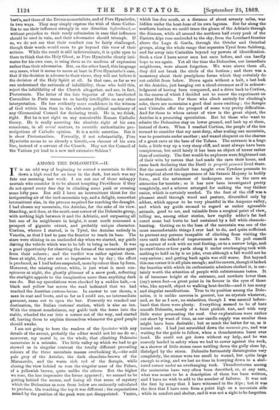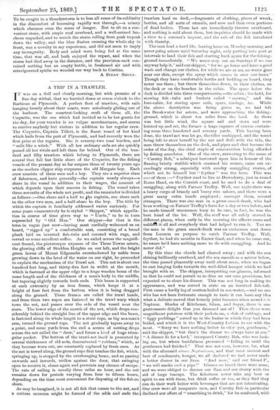AMONG THE DOLOMITES.—II.
IT is an odd way of beginning to ascend a mountain to drive down a high road for an hour in the dark, but such was my fate one morning last week. I am not one of those unhappy mortals who consider it to be almost tempting Providence if they do not spend every fine day in climbing some peak or crossing some lofty pass. But still I have an intermittent thirst for the invigorating air of the iced-mountain top, and a delight, somewhat intermittent also, in the process required for reaching the draught. I had chosen my mountain, the Antelao, for the sake of its view. Standing, as it does, at the south-east corner of the Dolomite group, with nothing high between it and the Adriatic, and surpassing all but one of its neighbours in height, it must need's command a prospect of gigantic extent, and probably unique character. Cortina, whence I started, is in Tyrol, the Antelao entirely in Venetia, so that I had to pass the frontier to reach its base. The stars were shining in an unclouded sky when we started, my guide diving the vehicle which was to be left to bring us back. It was a good opportunity for observing the forms of the mountains apart from their colours ; and the verdict was rather against them. Seen at night, they are not so impressive as by day ; the effect is produced, as I had before suspected, more by colour than by form. Moreover, the missing colour, white, is just what is most con- spicuous at night, the ghostly glimmer of a snow peak, reflecting the starlight appeals to the imagination more than anything dark can do. But my speculations were checked by a sudden halt,—a black and yellow bar across the road indicated that we had reached the Austrian custom-house. In answer to our shouts, a man in coat and boots, and so far as I could see, no intermediate garment, came out to open the bar. Presently we reached our destination, the Italian customs' station, which is also an inn. With the utmost nonchalance, my guide took the horse into the stable, wheeled the car into a corner out of the way, and started off, leaving them to explain themselves whenever the good people should awake.
I am not going to bore the readers of the Spectator with any details of the ascent, probably the editor would not let me do so ; moreover, my moral is, on the whole, that climbing Dolomite mountains is a mistake. The little valley up which we had to go showed us in singular contrast the totally different prevailing colours of the three mountain masses overlooking it,—the cold pale grey of the Antelao, the dark chocolate-brown of the Marmarolo, and the warm rich red of the Sorapis, while closing the view behind us rose the singular mass of the Pelmo, of a yellowish brown, quite unlike the others. But the higher we rose, the leas impressive the forms appeared ; we seemed to be getting behind the scenes, and losing all that sense of mystery which the Dolomites as seen from below are eminently calculated to produce. On reaching the top it was different ; the expectations raised by the position of the peak were not disappointed. Venice,
which lies due south, at a distance of about seventy miles, was hidden under the heat-haze of its own lagunes. But far along the southern horizon we could trace the gleam of the Adriatic through the dimness, while all around the northern half every peak of the Eastern Alps rose unclouded to the sky, from the Lombard frontier above the Lago di Garda, through the Orteler and Oetzthal groups, along the whole range that separates Tyrol from Salzburg, and far away into Carinthia beyond my powers of identification. Such a view I have never seen but once before, and can hardly hope to see again. Yet all the time the Dolomites, our immediate neighbours, were almost forgotten. We were above them all, they did not break the circle of the horizon ; and there was a monotony about their precipitous forms which they certainly do not exhibit from below. Down again without a halt, a last look at the Antelao, just hanging out a cloud-streamer as if in acknow- ledgment of having been conquered, and a drive back to Cortina, in the course of which I decided not to renew the experiment on another Dolomite. For those who climb entirely for climbing's sake, there are mountains a good deal more exciting ; the Sorapis. and Cristallo offer the prospect of some very pretty difficulties.. And for those to whom extent of view is the great object, the Antelao is a promising speculation. But let those who want to admire the Dolomites stay on lower ground, and look up at them, instead of down. When I reached Cortina, the people of the inn seemed to consider that my next duty, after scaling one mountain, was to penetrate under another ; and waxed eloquent on the charms of a great cave at the base of the Tofana. The entrance is a huge hole, a little way up a very steep cliff, and must always have been. conspicuous, but until lately it has been an object of terror rather- than of curiosity. The first would-be explorers were frightened out of their wits by ravens that had made the cave their home, and came back declaring that the Devil in propria persona lived there.. But the march of intellect has taught even Tyrolese peasants to. be sceptical about the appearance of his Satanic Majesty in bodily form, and the astuteness of innkeepers sees in the cave an attraction for tourists ; so it has now been investigated pretty completely, and a scheme arranged for making the way thither easier, which is certainly needed. To the foot of the cliff was a pleasant stroll through wood and pasture, diversified only by adders, which appear to be very plentiful in the Ampezzo valley, and which my guide seemed to regard as rather agreeable animals, good to eat, and valuable from a surgical point of view, telling me, among other stories, how rapidly adder's fat had cured some bad hurts he had sustained by a fall while chamois- hunting. Getting on to the base of the mountain was one of the most uncomfortable things I ever had to do, and quite sufficient to prevent any persons incapable of climbing from visiting the cave until the talked-of improvement is made. To pull oneself up a corner of rock with no real footing, on to a narrow ledge, and& to crawl three or four yards along it under overhanging rock with nothing to hold on by is no joke, even although a fall would not be very serious ; and getting back again was still worse. But beyond, this one corner it is all plain enough; and the cavern, though it lacked. the beauties with which its enthusiastic admirers clothed it, is cer- tainly worth the attention of people with subterranean tastes. It is of immense height at the entrance, and nowhere lower than (say) seven feet—a great point in its favour in the eyes of those who, like myself, object to walking bent double—and it has many and singular ramifications. 'Prue to its position among the Dolo- mites, it is unlike caverns in general, has no crystals whatever, and, so far as I saw, no stalactites, though I was assured before- hand that there were plenty. Everything seemed to be of bare smooth Dolomite, mostly of a faint pinkish tint, and with very little water permeating the roof. Our explorations were rather cut short by want of time, as our candle supply was smaller than might have been desirable but so much the better for us, as it turned out. I had just scrambled down the manuals pas, and was- waiting for the guide to follow, when a thunderstorm burst over head. He could not get down without my help, and he was. scarcely landed in safety when we had to cower against the rock, as a shower of little stones came rattling down the gully close by, dislodged by the storm. Dolomite fortunately disintegrates very completely, the stones were too small to wound, but quite large enough to sting, and we lost no time in hurrying down to a shel- tered corner under an overhanging rock. Thunderstorms among the mountains have very often been described, or, at any rate,. what was meant to be a description of them has been written, and I have no wish to add to the number of failures It was not the first by many that I have witnessed in the Alps ; but it was the first that I have seen from a point high on a mountain aide while in comfort and shelter, and it was not a sight to be forgotten,
To be caught in a thunderstorm is to lose all sense of its sublimity in the discomfort of becoming rapidly wet through,—a misery which obscures even the sense of danger. But to sit on a con- venient stone, with 'ample roof overhead, and a well-earned lun- cheon unpacked, and to watch the storm rolling from peak to peak down the valley, and the blue flashes crossing the whole sky in front, was a novelty in my experience, and did not seem to imply any incongruity. Body and mind were being fed at the same time, that was all, and both enjoyed the repast, and when the storm had died away in the distance, and the provision-sack con- tained nothing but an empty bottle, in freshened air and with reinvigorated spirits we wended our way back to Cortina.
A STRAY SHEEP.































 Previous page
Previous page